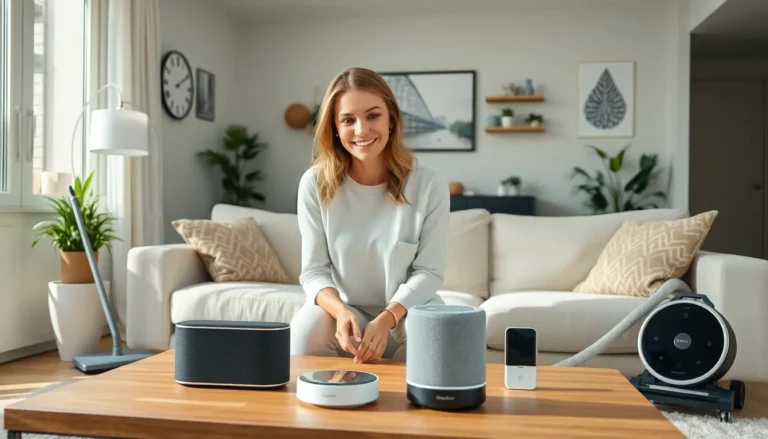In a world where juggling appointments and medications feels like a high-stakes circus act, prescription management apps swoop in like a superhero with a smartphone. Imagine having all your prescriptions organized in one place, reminders that actually work, and the ability to refill meds with just a tap. It’s like having a personal assistant who never takes a coffee break.
These apps aren’t just for the tech-savvy; they’re for anyone who wants to avoid the chaos of missed doses and forgotten refills. With a sprinkle of humor and a dash of practicality, these digital tools make managing prescriptions easier than ever. So why not let technology take some of the weight off your shoulders? Dive into the world of prescription management apps and discover a smarter way to stay on top of your health.
Table of Contents
ToggleOverview of Prescription Management Apps
Prescription management apps offer significant advantages for users in managing their medications efficiently. Users can easily track dosages and schedules with these digital tools. Medication reminders enhance adherence, reducing the likelihood of missed doses.
Many apps allow users to scan prescriptions for easy refilling. By syncing with pharmacies, these applications streamline the medication refill process, saving time and hassle. They also provide a history of medication usage, which can be beneficial during medical consultations.
Accessibility remains a key feature of prescription management apps. Simple interfaces cater to a broad audience, ensuring people of all ages can navigate these platforms. Security features, such as encrypted data storage, protect personal health information, fostering user trust.
Some apps include advanced features like drug interaction checkers. These tools enable users to identify potential interactions between medications, enhancing safety. Users benefit from having a comprehensive overview of their prescriptions in one place.
Many apps also offer personalized health insights based on medication history. This customization helps users understand how their prescriptions impact their overall health. Reviews and ratings from other users often contribute to selecting the most suitable app.
Evolving technology continues to shape prescription management apps. New features enhance user experiences while ensuring compliance with health regulations. As these applications develop, they play a crucial role in modern healthcare management.
Key Features of Prescription Management Apps
Prescription management apps offer several features that enhance user experience and medication safety.
Medication Reminders
Users receive timely alerts for medication doses. These reminders can be customized based on individual schedules. Some apps allow for specific notifications, such as reminders for taking medications before meals or at bedtime. Enhanced adherence results from these personalized alerts, making it easier for individuals to maintain their health regimen. Many apps also provide visual prompts, reinforcing the habit of taking medications on time.
Refill Requests
Easy refilling of prescriptions stands out as a core feature. Users can quickly submit requests directly through the app, eliminating potential pharmacy delays. Many apps support functionality that sends refills to the user’s pharmacy automatically, ensuring a continuous supply of necessary medications. The ability to track refill history also helps users manage their medications effectively, reducing the risk of running out of essential drugs.
Drug Interaction Alerts
Safety is prioritized through drug interaction alerts. These features analyze the user’s medication list to identify potential harmful interactions. Alerts notify users if a combination of drugs might create issues, enhancing patient safety. Users benefit from having this critical information at their fingertips, helping them make informed decisions about their health. Staying aware of interactions fosters a proactive approach to health management and encourages open discussions with healthcare providers.
Benefits of Using Prescription Management Apps
Prescription management apps offer numerous advantages that enhance the overall healthcare experience. They simplify tasks such as medication scheduling and refills, making it easier for users to maintain adherence.
Improved Adherence to Medication
Enhanced adherence to medication becomes evident with these apps. Customizable reminders ensure users receive timely notifications, reducing the likelihood of missed doses. Real-time tracking of dosages and schedules helps individuals stay accountable. Additionally, many apps provide visual indicators showing adherence rates, motivating users to stick to their medication plans. Research indicates that consistent reminders can improve medication adherence by over 30% in individuals managing chronic conditions. Through these features, individuals experience improved health outcomes and a more structured approach to their treatment regimens.
Accessibility of Health Information
Accessibility of health information stands out as a critical benefit of prescription management apps. User-friendly interfaces allow people of all ages to navigate their medication details effortlessly. With secure data storage, personal health information remains protected while still being easily retrievable. Users can manage their prescriptions without technical barriers, making healthcare more inclusive. Many apps also offer educational resources about medications, enhancing users’ understanding of their health. Furthermore, direct access to refill requests streamlines communication with pharmacies, promoting seamless management of medications throughout treatment.
Popular Prescription Management Apps
Prescription management apps simplify medication oversight. They offer functionality that supports users in managing their health efficiently.
App 1: Overview and Features
Medisafe stands out in the market for its intuitive design and comprehensive features. Users can set customizable reminders, which directly contribute to medication adherence, enhancing it by over 30%. The app allows for prescription scanning, making refills easy and efficient. Users appreciate its drug interaction checker, which automatically analyzes medication lists for potential interactions. With secure data storage, personal health information remains protected. Medisafe’s tracking features enable users to monitor their medication history effectively, making it ideal for consultations with healthcare providers.
App 2: Overview and Features
MyTherapy combines medication management and health tracking seamlessly. This app enables users to log their medication intake alongside vital health metrics, fostering a holistic view of their health. Reminders are versatile, offering alerts for medications and health tracking activities. An integrated pill tracker visually reinforces adherence and helps prevent missed doses. Additionally, MyTherapy’s ability to sync with pharmacies simplifies refill requests. Users can also benefit from personalized educational resources related to their medications, empowering better understanding and management of their treatment plans.
Considerations for Choosing an App
Choosing the right prescription management app involves several key factors. Users often find certain features essential for their medication management experience.
User Interface and Experience
Intuitive design makes a significant difference. Well-organized interfaces enhance navigation and usability. Engaging features like customizable reminders attract user interest. Ease of interaction leads to more consistent medication adherence. Simple layouts allow users of all ages to access essential information without confusion. Many apps provide tutorials or guidance to familiarize users before they begin managing their prescriptions. A positive user experience often results in better medication compliance and overall health management.
Security and Privacy
Security of personal health information remains crucial. Encrypted data storage protects sensitive medical records. Users must look for apps that comply with regulations like HIPAA to ensure safety. Trustworthy apps offer transparency about their data protection practices. Many provide options for two-factor authentication to enhance user security. Additionally, it’s essential to verify how apps share information with third parties. Strong privacy policies foster confidence in users as they manage their health data. Prioritizing these elements contributes to a safer, more reliable prescription management experience.
Conclusion
Prescription management apps are transforming the way individuals handle their medications. By offering user-friendly interfaces and advanced features, these tools empower users to take control of their health. The convenience of setting reminders and tracking dosages significantly enhances medication adherence, making it easier to manage chronic conditions.
With security measures in place, users can feel confident in the protection of their personal health information. The integration of educational resources and drug interaction checkers further supports informed decision-making. As technology continues to evolve, these apps will play an increasingly vital role in modern healthcare, ensuring that managing prescriptions is not just simpler but also safer and more effective.



